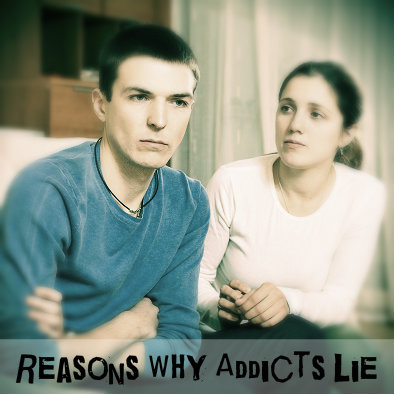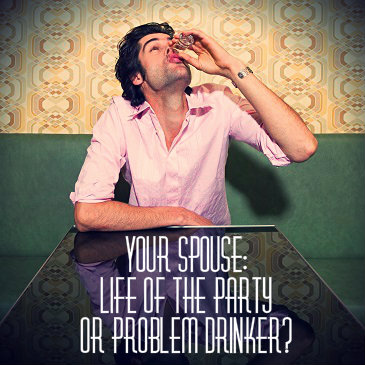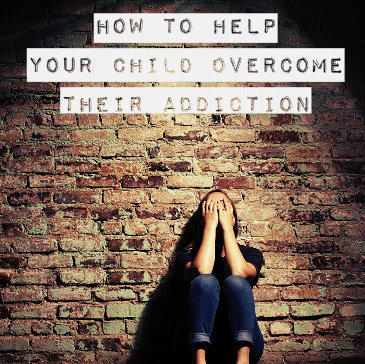18 Sep 2014
Why Addicts Lie
If you have an addict in your life you have been through some trying times. Your addict has a disease, but it’s a tricky one. She may cheat on you, lie, neglect you, steal from you or even hurt you. For those in close relationships with an addict, lying is one of the most hurtful behaviors to experience. You expect honesty in your intimate relationships, but addicts lie all the time.
Reasons Addicts Lie
 To help you cope with the lying and to learn to forgive and move past it, it helps to understand. Although it may not be right, there are real and valid reasons addicts lie.
To help you cope with the lying and to learn to forgive and move past it, it helps to understand. Although it may not be right, there are real and valid reasons addicts lie.
Addicts Lie To Avoid Confrontations
As you watched your loved one slide into addiction and ruin her life, you probably made numerous attempts to get her to stop. At times you may sound like a broken record and a nag. Maybe the issue has led to increased conflict. The stress of these confrontations is overwhelming and destructive for both of you. While you want to be honest, get the problem out in the open and find a solution, she just wants to avoid your hurt looks and anger. In order to get out of these conflicts and to avoid them, she will tell every lie imaginable.
Addicts Lie To Maintain The Addiction
Lies also help your addicted loved one to perpetuate her addiction. Most addicts are afraid to stop using for a number of reasons. They fear the idea of stopping because they feel like they need drugs or alcohol. The pain and discomfort of detoxing are scary and so is the possibility of failing. The idea of trying to live a sober life, and what that might be like, is even scarier. To keep the addiction going, your loved one will tell many lies. Lying becomes a tool for self-preservation.
Addicts Lie Because Of Shame
Addicts feel a great deal of shame. Although societal attitudes are very slowly changing, there is still a great deal of stigma attached to addiction. Many of us still view an addict as a person who is morally weak. It’s no wonder that addicts feel ashamed of what they do. Especially in sober moments, your loved one feels a huge sense of guilt, embarrassment and shame. Instead of working through these feelings, she uses more and then lies about it. She doesn’t want other people to realize just how badly she is doing.
Addicts Lie Because Of Denial
Denial is a powerful force and most addicts use it to cope with their problems. Despite all the evidence to the contrary, most addicts refuse to admit to having an addiction. They lie because they don’t want to make that admission. Your loved one probably thinks that she is different from other users. She can handle it, she says. She is in denial that her problem is no different from that of other addicts and as a result she lies to you and to herself.
As you cope with having a loved one addicted to drugs or alcohol, realize that her lying to you is not a personal attack. This is her coping mechanism and a rational part of the disease of addiction. This doesn’t mean that you should accept the lies. To help your loved one, you have to push through the falsehoods and ask her to face up to the truth. Don’t let her get away with lies when you catch them, but do provide ongoing love and support.
You’re married to the life of the party. You probably have a lot of fun with him. He loves going out with friends and entertains everyone with funny stories and goofy antics. Everyone loves him, right? But you see him the next day, worn out, hung over, unable to remember all the details of the previous night. Your husband or partner is paying a high price for his social status. Being the fun one is great, but if it is forced through the veil of drunkenness, he may have a serious problem with alcohol.
What Is An Alcoholic?
 The idea of your spouse as an alcoholic is scary. The odds are he isn’t one, but it is worth educating yourself about alcoholism if you suspect he drinks too much. Alcoholism, or alcohol dependence, is a true addiction and a serious disease. It takes a lot of drinking over a long period of time to become an alcoholic. If your husband binges and regrets it on weekends, he may not be an alcoholic — yet.
The idea of your spouse as an alcoholic is scary. The odds are he isn’t one, but it is worth educating yourself about alcoholism if you suspect he drinks too much. Alcoholism, or alcohol dependence, is a true addiction and a serious disease. It takes a lot of drinking over a long period of time to become an alcoholic. If your husband binges and regrets it on weekends, he may not be an alcoholic — yet.
One of the most characteristic attributes of alcohol addiction is the presence of withdrawal symptoms. These are real, physical symptoms that result when an alcoholic stops drinking. They include tremors, anxiety, nausea, sweating, insomnia, headaches, depression and fatigue. Alcoholics severely crave alcohol to make these symptoms go away.
What Is A Problem Drinker?
While your husband may not be an alcoholic, it does not mean that he doesn’t have a problem at all. He could be a problem drinker or an almost alcoholic. Problem drinking can often look very much like being the life of the party. A problem drinker may also be that tired working mom who needs a couple glasses of wine to relax at the end of the day, but then can’t sleep well or loses her cool with the kids. A problem drinker may be someone who has symptoms of depression and drinks to feel better instead of getting help.
Any type of drinking that causes problems is problem drinking. Your husband has fun at parties and may never drive home afterward, but the next day is shot because of his hangover. He regrets the fact that he started a stupid argument with you while he was drunk. You ask him to slow down his drinking at parties and he won’t do it. Your relationship gets to be tense as a result. These are all problems caused by his behavior.
Should I Ask My Spouse To Stop Drinking?
If you have determined that your husband is indeed a problem drinker, it’s time to sit him down for a talk. Understand that he will probably be defensive so approach the topic carefully. Do not bring up the idea of alcoholism and even avoid the term problem drinker if you think that will help. Lead with how his drinking makes you feel and how you fear it will damage your relationship in the future. Discuss how much better he will feel in the morning without a hangover.
His counter arguments are likely to be that he only drinks on the weekends to de-stress or that he drinks only socially and that it isn’t a big deal. Remind him of how he feels the next day, of the regrets he usually expresses and emphasize that his drunkenness impacts you. Tell him that you hope he will slow down, but not that you need him to quit drinking altogether. Suggest that you skip one party and do something together instead to strengthen your relationship. By being honest with him you can begin to address and correct the problems that his drinking is causing.
If his drinking gets worse, it may need to come down to a professional intervention. Call us now for intervention help. You and your partner’s relationship and physical/mental health are worth it!
Your child is struggling with addiction. You have always been his caregiver. As a parent, you have taken care of him, helped him when he was down, kept him safe and took action when needed. Now that he is facing this very personal battle, you may feel helpless. How can you possibly take care of his needs when he is being ravaged by this disease? As a parent, the feeling of helplessness that accompanies the addiction of a child can be overwhelming and leave you with a sense of despair. You can’t fix the problem, but you can be there for your child and lend your support.
Why Can’t I Fix His Addiction?
You cannot fix your child’s addiction or cure him of it because addiction is a chronic disease with no hard and fast cure. You would never blame yourself for not being able to cure your child’s asthma or diabetes because you are not a doctor. You are not an addiction expert, a therapist or a doctor and you cannot treat or cure his disease. The sooner you are able to accept this fact, the better you will feel. That sense of helplessness will begin to lessen when you accept that your child has a disease that will require treatment by experts.
Can I Help My Child Overcome Addiction?
 You do have the ability to help your addicted child. Once you accept that you cannot fix the problem, you can take steps to help him. Doing so will help to relieve those helpless feelings threatening to overwhelm you. In fact, taking action of some kind will keep you from falling into hopeless despair, which often leads to lethargy and inaction. Your child does need you now, so take steps to do what you can to help:
You do have the ability to help your addicted child. Once you accept that you cannot fix the problem, you can take steps to help him. Doing so will help to relieve those helpless feelings threatening to overwhelm you. In fact, taking action of some kind will keep you from falling into hopeless despair, which often leads to lethargy and inaction. Your child does need you now, so take steps to do what you can to help:
- Educate yourself – You have been blindsided by this problem and you probably have little experience with addiction. To better understand what your child is going through and what he needs from you, educate yourself about the disease of addiction. It will help you to have patience with him and to learn how to better support and assist him.
- Investigate treatment options – Unless your child is still a minor, you cannot force him to get professional help. You can, however, present him with options for treatment. Talk to your doctor about resources for addiction care and collect information about your options. Visit therapists and rehab facilities to get an idea of what is available and so that you can give your child the best choices when he is ready for help.
- Consider family therapy – Addiction is a disease that affects the entire family. Once your child has decided to get help, you can be an active participant. Engage in group therapy sessions with your child and other members of the family. He will find motivation in seeing that you and his loved ones are committed to his treatment.
- Build support – Your child is going through a difficult struggle, but so are you. You cannot give all your attention to him and forget about your own needs. Make sure you have built up support for yourself. Consider joining a support group for the loved ones of addicts. Also make sure that you have friends or family with whom you can talk when you feel overwhelmed and stressed. Support is necessary for addicts, but it is important for you too.
It is only natural to feel helpless when you cannot fix your child’s problem. You can guide him through it, though, and you can support him. When he is ready for help, be there for him and you will be doing the best you can.
If You Or Someone You Love Is Struggling With Drug Or Alcohol Abuse, You’ve Come To The Right Place – Help Is Just A Phone Call Away!
09 Jul 2014
4 Tips To Cope When A Loved One Goes To Rehab
If you have a loved one struggling with addiction, getting her into rehab has probably been your top priority. Now that she’s gone, how do you cope? An important person is missing from your life. You have cared for her, been there for her, tried to help her overcome her addiction, and now you have turned your responsibilities over to someone else. You may be experiencing feelings of loss or guilt. Now is the time to learn how to take care of you, how to feel comfortable letting go, and how to get ready to have a sober loved one return home.
1. Learn About Addiction And Treatment
 Information is power and knowing more about what your loved one is going through will help you to better understand her. It will also help you to feel connected to her while you cannot be together. Read up on addiction, what it is, what it means for the addict, and how it impacts everyone around the addict. Learning about this disease will give you important insights into your situation.
Information is power and knowing more about what your loved one is going through will help you to better understand her. It will also help you to feel connected to her while you cannot be together. Read up on addiction, what it is, what it means for the addict, and how it impacts everyone around the addict. Learning about this disease will give you important insights into your situation.
You should also learn more about addiction treatment so that you know what is happening with your loved one at rehab. You may not be able to hold her hand through the process, but you will feel more comfortable when you understand what it entails. It may also be possible for you to get involved in her treatment at some level. Most rehab facilities offer family counseling as a component of treatment. Be sure to volunteer for these sessions to give you a chance to see your loved one and to participate in her care.
2. Join A Support Group
Being on the outside can be tough. You want to be there with her, helping her along the way. Surrendering that control to others is not always easy. One important way to cope with your feelings is to share with and learn from others. There are numerous support groups available to help the loved ones of addicts. They can be general groups that include all loved ones of addicts, or more specific. The great benefit in joining a support group is to share the burden of your grief, your guilt and all the other negative emotions attached to your loved one’s addiction and treatment.
3. Find Your Passion
As you learn to cope with having temporarily lost your loved one to rehab and treatment, it is important that you tend to yourself. For a long time you have cared for the addict in your life. You have looked out for her needs and spent so much of your time and energy worrying about her. Now that she is in the capable hands of treatment specialists, you can take care of you.
One of the best ways to do that is to focus on what you love to do. Return to an old hobby that you once felt passionate about or try something new that you have always wanted to do. The road ahead will be difficult and having something that’s entirely yours that you feel passionate about will help you cope both now and in the future.
4. Accept And Trust That Everything Will Be Ok – No Matter What
Having a loved one in rehab can be stressful for you. Just remember that you have left her in good hands with professionals who have experience treating addicts and who care about the patients they treat. Also remind yourself of how necessary this step was. She would never have been able to heal without professional treatment. Take care of yourself, participate in her sessions where possible and be ready to welcome back your sober loved one.
Read Our Other Posts For Friends And Family Of Addicts – Recovery Is Possible – Call Us Now To Begin The Path To Healing And Freedom From Addiction!
The struggle of a spouse coping with an addicted partner is one that is often discussed, written about and addressed as an important element of addiction treatment. What we don’t hear about as often are the cases in which both partners in a marriage are battling addiction. For a spouse who has never had an addiction, watching her loved one struggle and trying to lend support and love is an extreme challenge. If both people are addicted, it magnifies the problem. How do you support each other when you are each battling your own addiction demons and trying to stay clean?
Should I Get Addiction Treatment With My Spouse?
 The most important decision you both need to make is to each get help. How you do that and what resources you use to get help are less important than taking that first step. Once you have both agreed that you need the care of addiction professionals, you are ready to face the rest of your journey. The next question to be answered is whether you go it alone or try to go through rehab together.
The most important decision you both need to make is to each get help. How you do that and what resources you use to get help are less important than taking that first step. Once you have both agreed that you need the care of addiction professionals, you are ready to face the rest of your journey. The next question to be answered is whether you go it alone or try to go through rehab together.
The good news is that you have options. Addiction treatment has advanced tremendously over the last couple of decades. There are many more ways in which you can get care, and if you want to, you can do it together. One benefit of working together is that you both stand a better chance of being on the same page if you receive the same program of treatment from the same professionals. Different treatment programs adhere to different philosophies and when you both work with the same one, you will understand each other better. Working together will also give you the opportunity to address your relationship issues as well as your addictions.
One philosophy of addiction treatment says that you should be solely focused on yourself. If you work together on your treatment, you may fall into bad relationship habits and fail to devote yourself entirely to your own healing process. Discuss your options together and consider asking the opinions of addiction professionals as well. You can always change your plan if working together or apart does not go as you hoped it would.
What If My Spouse Won’t Commit To Treatment?
As long as you both are committed to getting treatment for your individual problems, your relationship stands a chance of surviving your addictions. What happens if one of you refuses treatment or won’t follow through with it? This situation can be incredibly difficult for both partners. If you are moving forward and your spouse is falling behind, you have a major problem. Staying together means that your spouse could drag you back into addiction. If you separate, it could mean that your spouse falls into an even deeper hole.
The ultimate decision as to how to handle a spouse who won’t join you on your journey to sobriety is personal. Only you can decide what is right for you and your relationship, but know that you likely won’t last long if one of you is abusing drugs or alcohol while the other is in recovery. It’s a volatile situation that is bound to blow up. If your spouse refuses to get help, do everything in your power to encourage him or her do so so. If you can’t, it may be time to move on. It will feel like a terrible abandonment, but you can only change yourself. Your transformation into a healthy and sober person may even be the push needed to get your spouse to follow suit.
You And Your Spouse Are Worth It – Give Us A Call Now To Begin The Healing!
30 Jun 2014
Does Addiction Need To Lead To Divorce?
Addiction can wreak complete havoc on a marriage. The addict partner may neglect or even abuse his or her spouse, drain the family’s finances, and be completely unavailable to any family member. The resulting feelings in the non-addicted spouse often include depression, resentment, anger, and even outright hatred. It seems inevitable that these marriages are headed for divorce, but when both partners make a commitment to work through the issues, that outcome can be avoided.
How Can The Addict Turn Things Around?
 If you are the addict and you want to save your life and your marriage, the first and most important thing you can do is to get treatment for your addiction. Commit to your treatment plan and work hard to get sober and stay sober. This step is a powerful statement to your spouse about your intentions. Actions always speak louder than words; if you have promised your spouse again and again that you would get help but didn’t follow through, only action will save you now.
If you are the addict and you want to save your life and your marriage, the first and most important thing you can do is to get treatment for your addiction. Commit to your treatment plan and work hard to get sober and stay sober. This step is a powerful statement to your spouse about your intentions. Actions always speak louder than words; if you have promised your spouse again and again that you would get help but didn’t follow through, only action will save you now.
In spite of making the move to get help and make things better, some marriages fall apart once the addicted spouse enters recovery. Seeking addiction treatment means more time that you need to focus on yourself and your recovery to the neglect of others. As you go into rehab, talk to your spouse and explain that you will need to be self-involved for a little bit longer, and that it is necessary in order for you to get well again. Ask for patience and time. Involving your spouse in the process to some extent can be helpful for your marriage. Consider including some therapy sessions with the both of you so you can start working on rebuilding your relationship as you learn to be sober.
How Can A Spouse Forgive?
If you are the non-addict, forgiveness and repairing your relationship with your spouse may seem impossible. You have been hurt and ignored, time and time again, but as long as your spouse is seeking treatment, there is hope. Start on the path to forgiveness by learning more about addiction. The more you understand the disease, the more likely you will be to develop some compassion for your spouse.
It may also be helpful for you to seek some counseling. See a therapist who specializes in helping people who have been hurt by addicts. Also consider joining a support group for the loved ones of addicts. You can learn a lot from the experiences of others who have been in your position. The support and camaraderie can also be a powerful tool for healing. Once you have taken the time to work on yourself, be prepared to forgive and to get involved in your spouse’s treatment. Your marriage cannot move forward if you still harbor grudges and resentments.
What if Divorce Is The Best Option?
Despite your best efforts your marriage may be headed for failure. How do you know if divorce is your best option? If you are the recovering addict, no matter how much you try, your spouse may not be able to forgive you or get past the damage you have caused. If you are the injured party, you may try everything to get your spouse to stay clean, but you see failure again and again. If you can’t live with your spouse anymore, you may need to follow through with a divorce. Even if you do split up, keeping up with therapy for both spouses is crucial. You have both been damaged and you both need healing, no matter what happens to your marriage.
If You Or Your Spouse Is Struggling With An Addiction – Call Us Now – We Are Here To Help!


